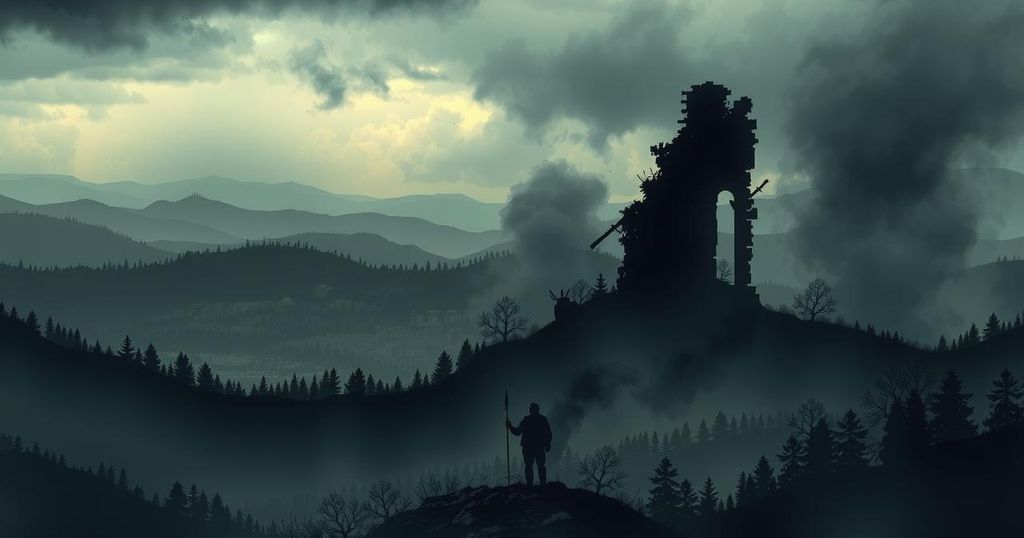The M23 rebel group, allegedly backed by Rwanda, claims to have seized Goma in eastern DRC, leading to mass displacement. They demanded the surrender of Congolese soldiers, resulting in some yielding to UN forces. The ongoing conflict is rooted in historical tensions and significantly exacerbates the region’s humanitarian crisis.
Fighters from the M23 rebel group, reportedly supported by Rwanda, assert that they have captured Goma, a key city in the eastern Democratic Republic of the Congo (DRC). This swift advance has resulted in the displacement of countless individuals and poses a threat to regional stability. M23 spokesperson Lawrence Kanyuka urged residents to remain calm, emphasizing that the situation was under control following the successful liberation of the city.
It remains unclear how extensive the M23’s control over Goma is; however, citizens reported seeing rebel fighters in the city’s center. Gunfire was audible in proximity to the airport, city center, and along the Rwanda border. M23 had demanded the surrender of government soldiers by 3 AM, with reports indicating that approximately 100 Congolese soldiers surrendered their arms to Uruguayan forces involved in the UN peacekeeping mission, Monusco. Meanwhile, Monusco personnel and their families began evacuating to Rwanda.
The eastern DRC is a volatile region, rife with militia groups that originated after the 1994 Rwandan genocide. M23 is the latest in a longstanding series of Tutsi-led rebel factions that have operated in this area. UN special representative Bintou Keita informed the UN Security Council that despite the involvement of peacekeepers, M23 and Rwandan troops had entered neighborhoods on Goma’s outskirts, inciting widespread panic and using civilians as human shields amid the chaos.
DRC’s foreign minister, Thérèse Kayikwamba Wagner, addressed the Security Council, characterizing Rwanda’s actions as overt aggression and a declaration of war devoid of diplomatic pretense. In response, Rwanda’s ambassador to the UN, Ernest Rwamucyo, refrained from confirming DRC’s allegations, alleging that the DRC government had failed to demonstrate a sincere commitment to peace, which he claimed led to the current crisis.
M23 claims to exist for the protection of the Tutsi ethnic group residing in DRC, having briefly seized control of Goma in 2012 before withdrawing following cuts in international aid to Rwanda. The group reemerged in late 2021, reportedly receiving greater support from Rwanda. The ongoing offensive by M23 exacerbates one of the largest humanitarian crises globally, with more than one-third of North Kivu’s population currently displaced, according to UN reports.
The current conflict in the eastern Democratic Republic of the Congo (DRC) can be traced back to the aftermath of the Rwandan genocide in 1994, which resulted in a complex web of ethnic violence and political strife in the region. The M23 rebel group is part of this ongoing turmoil, representing Tutsi interests and has been involved in intermittent bouts of violence in DRC. Their resurgence signals heightened tensions not only within the DRC but also with neighboring Rwanda, as accusations of military support and aggression are exchanged between the two nations. The UN’s involvement through peacekeeping missions aims to stabilize the region amidst this perilous situation, but the humanitarian impact continues to escalate significantly, affecting millions of vulnerable individuals.
The claim by the M23 rebel group of capturing Goma indicates a significant escalation in the conflict within the eastern DRC, driven by complex historical enmities and regional dynamics. The involvement of foreign powers, particularly Rwanda, complicates efforts for peace and stability in the area. As humanitarian needs grow worse with increasing displacement, the international community faces pressing challenges to address the crisis while attempting to restore order in this volatile region.
Original Source: www.theguardian.com






